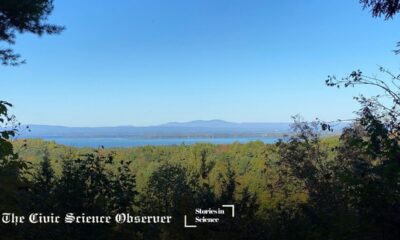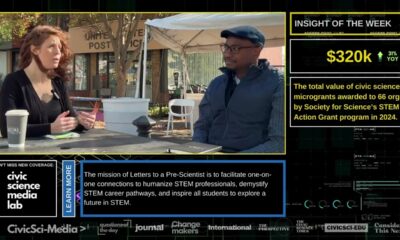Stories in Science Special Series
Using the ‘fear of missing out’ to my advantage in science
Priscila is a Ph.D. Candidate in the Department of Molecular Genetics at The Ohio State University (OSU). She was born and raised in a rural town in Puerto Rico. She is interested in science communication, biomedical and plant research. She is also a Cellular, Molecular, and Biochemical Program Trainee and a Yale Ciencia Academy Alumni (class of 2017).

Priscila Marie Rodríguez García
[su_boxbox title=”About”]Priscila is a Ph.D. Candidate in the Department of Molecular Genetics at The Ohio State University (OSU). She was born and raised in a rural town in Puerto Rico. She is interested in science communication, biomedical and plant research. She is also a Cellular, Molecular, and Biochemical Program Trainee and a Yale Ciencia Academy Alumni (class of 2017). You can find Priscila at priscila-rodriguez.com, on Twitter (@priscila_marie), and LinkedIn. Download the Story! [/su_boxbox]
[su_boxnote note_color=”#d9d8d6″]
Story Key Points
- Don’t be afraid to reach out to people.
- Be persistent with your passions.
- Simple actions may have a big impact on others.[/su_boxnote]
[dropcap]M[/dropcap]y family has witnessed all the school clubs, programs, and teams I have participated in from an early age. This includes the “friends of the library” club, the school chess team, the elementary school choir, and the list goes on. This desire to participate comes from my “fear of missing out”, or FOMO as it’s referred to, and I saw it as a problem. However, from each of these experiences, I gained something that has benefited me. Therefore, I now embrace my fear and use it to my advantage.
Attending scientific conferences is one of the activities I started doing because of my FOMO. I attended my first scientific conference as a junior in college in 2011. Since then, I have attended at least one conference – on average – a year. This year, as a graduate student, I attended the 2018 Society for the Advancement of Chicanos/Hispanics and Native Americans in Science (SACNAS) annual national conference at San Antonio, Texas.
I had been aware of this conference since my undergraduate years. But it wasn’t until the summer of 2017 that I decided to apply for a poster presentation. My abstract was rejected, but this year I applied again and got in. So I went to SACNAS 2018 expecting it to be like every other conference I have been to. Little did I know about the great experiences I would have at the conference.
The least you can do is reach out.
About a month prior to attending the conference, I decided to start listening to podcasts while doing bench work in my lab. In the beginning, I listened to podcasts about horror movies but I quickly realized that I could be using that time to listen to science-related topics so that I could be well versed about topical issues in science. That’s when I remembered that Dr. Mónica Feliú-Mójer – one of the people I consider as mentors – was interviewed for a podcast named Hello PhD. This is how I found out about the hosts of the podcast, Drs. Joshua Hall and Daniel Arneman.
Fast forward to SACNAS 2018, I found myself scrolling through my Twitter feed during one of the lunches at the conference. As I scrolled, I stumbled upon Dr. Hall’s tweet: “Happy to be in San Antonio for #SACNAS2018. Excited to meet students and catch up with old friends!”. My FOMO kicked in and, without thinking it through (because it’s Twitter, so no big deal, right?), I replied: “That’s awesome! I’m a grad student presenting a poster this afternoon. I really like your podcast, so I’d love to meet you and get a pic!”.
After reaching out to Dr. Hall, I thought to myself: “He is not going to come by my poster. Why would he? Well, at least I tried.” That afternoon I was standing in front of my poster, trying to look inviting, but steering away from the overly-enthusiastic-almost-stalker face. A graduate student from the University of Florida stopped by, as well as the mentor-judge professor that evaluated me. Two of my friends – that I had not seen in years – also stopped by. While I was talking to one of my friends, I noticed someone standing within poster-presentation distance. I immediately looked more closely in that direction and caught a glimpse of Dr. Hall!
I was so surprised that he came that I almost said: “What are you doing here?” But I immediately remembered that I had asked him to come by. I think it was my impostor feelings lurking in my mind that made me doubt that he would pay attention to my Twitter request.
Again, I never thought Dr. Hall would show up at my poster. It was a great surprise. The lesson? I encourage students to reach out. Don’t let the feelings of doubt keep you from at least trying to connect with potential mentors.
We introduced ourselves, talked about his podcast, and about life as a PhD student. He then asked me if I wanted to present my work. I had briefly forgotten that I was in front of my poster. So, I took a quick moment and switched into my “presentation mode.”
The first thing I did was ask if he was familiar with plant immunity, my area of research. Joshua said that back in 2003, he had done one of his lab rotations in Dr. Jeff Dangl’s lab, which also studies plant immunity. I could not believe it … Dr. Dangl was my advisor’s post-doctoral advisor! I whispered in my mind, “what a small world!”
Because of his lab rotation experience, Dr. Hall knew the differences between plant and human immune systems. The human immune system is made of immune cells that circulate through our body. However, the plant immune system exists in all the cells of the plant because when threatened by a pathogen, each cell in a plant is capable of inducing a defense response.
I explained to Dr. Hall that I was studying a specific plant protein (RIN4) involved in plant immunity. This protein is important in activating plant defense responses when needed and keeping them turned off when not. I further explained that although a lot is known about RIN4, we still had not figured out – at the molecular level – how it interacts with other proteins to fulfill its different functions. Therefore, my project focused on dissecting the molecular interactions that RIN4 has with different proteins. At the end of our conversation, Dr. Hall and I discussed some of my preliminary data and I thanked him for taking the time to come by my poster and chat with me.
Again, I never thought Dr. Hall would show up at my poster. It was a great surprise. The lesson? I encourage students to reach out. Don’t let the feelings of doubt keep you from at least trying to connect with potential mentors. You never know what great conversations and connections you may develop. Plus, a little secret I learned throughout the years is that professionals were students once, and, like you and me, most of them are more than happy to connect with and help others.
If you are a student (at any level) you should follow Joshua’s podcast. Click here to go to the Hello PhD podcast website.
A story of persistence
During SACNAS 2018, I was asked if I wanted to serve as a mentor-judge for undergraduate poster presentations. As I have mentioned before, my FOMO is always pushing me to say yes to opportunities like this. So, I agreed of course.
When the session started, I immediately went to the first poster and presented myself to the student as her mentor-judge. We talked for a while, and to be able to write down her evaluation, I stepped away. However, while I was filling her evaluation form, another student came to me. This student told me that he was given the same poster number as the student I had just talked to and he wanted to get feedback from me as a mentor-judge.
This was my first time attending a SACNAS national conference and I had a great experience. So, I wanted him (and everyone there) to have the same feeling. I decided to help him and give him some feedback. I apologized for the confusion and promised to look for an evaluation sheet so that I could give him a score and written feedback.
I finished the first student’s evaluation and went to get another evaluation sheet. Unfortunately, the extra evaluation sheets were outside the Exhibit Hall, and I would end up losing valuable time going outside. As such, I decided to go to the closest exhibitor’s booth and get a piece of promotional material that I could write an evaluation on. I found one and ripped it in half. I took one half and wrote the skeleton of the evaluation sheet. On the other half, I copied the scoring sheet that I had to hand out to the staff at the end of the session. I ran back to the student’s poster and explained to him what I had done. He thanked me for my effort and went on to explain his research.
The student, Lambert Ngenzi – an undergraduate from Washington State University – was investigating the efficiency of a computer program used to survey bodies of water through imaging. The study had the right controls and logical analyses; however, what was striking was the motivation behind it.
Lambert explained that he is originally from the Democratic Republic of the Congo in Africa, where his community struggles with clean water availability. Ultimately, he wants to attend graduate school to research water quality and management. He wants to apply his research to his home country, which he explained has a fast growing population (more information here).
I was amazed. It is not often that you see an undergraduate student that knows how they want to help their community. I went on to encourage him to continue pursuing his dream. I explained to Lambert that he already had what a lot of graduate students lack: a direct connection of their research to their community.
The next morning, during the presentations’ awards ceremony, Lambert’s name came up as one of the awardees. It filled me with joy that his work and commitment with science and helping his community was recognized.
I am sharing this to emphasize two points: (1) finding purposeful motivation can help you in your research, especially when you encounter challenges; and (2) if you can help someone, especially in science where we become so isolated in our benches, do it. Actions that you may find simple could have a big impact on others.
Cover image provided by Priscila Marie Rodríguez García
Metrics
Sessions
Total number of Sessions. A session is the period time a user is actively engaged with the page.
Visitors
Users that have had at least one session within the selected date range. Includes both new and returning users.
Page views
Pageviews is the total number of time the article was viewed. Repeated views are counted.
The CS Media Lab is a Boston-anchored civic science news collective with local, national and global coverage on TV, digital print, and radio through CivicSciTV, CivicSciTimes, and CivicSciRadio. Programs include Questions of the Day, Changemakers, QuickTake, Consider This Next, Stories in Science, Sai Resident Collective and more.

-
 Audio Studio1 month ago
Audio Studio1 month ago“Reading it opened up a whole new world.” Kim Steele on building her company ‘Documentaries Don’t Work’
-
Civic Science Observer1 week ago
‘Science policy’ Google searches spiked in 2025. What does that mean?
-
Civic Science Observer1 month ago
Our developing civic science photojournalism experiment: Photos from 2025
-
Civic Science Observer1 month ago
Together again: Day 1 of the 2025 ASTC conference in black and white
Contact
Menu
Designed with WordPress

























